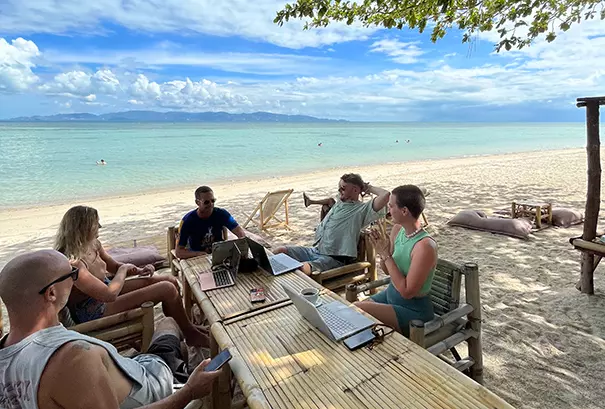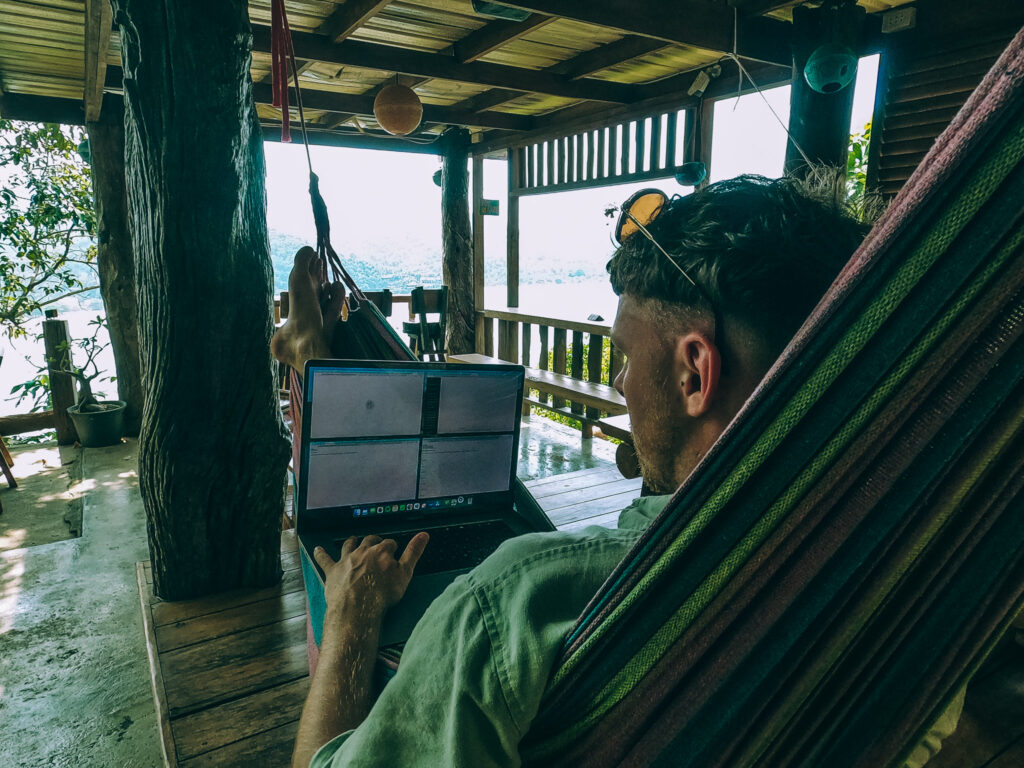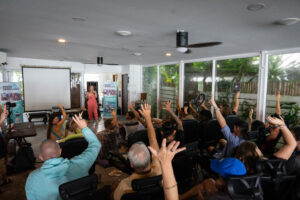What is a Digital Nomad?
Imagine waking up each morning in a different paradise. Sunsets in Bali, coffee breaks in Budapest, a co-working space with an ocean view in Thailand – this is the reality of a digital nomad.
No longer chained to a cubicle, digital nomads blend travel with remote work, building a life less ordinary. Today’s digital nomads are a diverse, thriving community united by a common desire: to work anywhere, anytime, and experience the world on their own terms.
But what exactly is a digital nomad? And is this nomadic lifestyle really the dream it’s cracked up to be? Is it just fancy Instagrammable escapism, or a legitimate career path with real benefits?
Let me unpack this lifestyle for you, straight from my own experiences as a digital nomad and the insights of fellow digital nomads that I’ve met on my travels.
Digital Nomads Work Remotely From Anywhere In The World
The digital nomad lifestyle isn’t just about picturesque Instagram posts; it’s a reality for many individuals who, like me and the others on Team DNA, have embraced a workstyle that prioritizes freedom, flexibility, and exploration.
The defining characteristic of a digital nomad is the ability to work remotely. But don’t get confused – it’s not just about having a laptop and a thirst for travel; we work hard, leveraging technology to sustainably earn a living while we travel.
It is more than just checking and answering emails on vacation – it’s about earning a full-time income from anywhere in the world with a decent Wi-Fi connection.
The key is having a fully location-independent job so that you can work from wherever you want to while utilising the technology and tools at your disposal to maintain your work-life balance. This opens up a world of possibilities, limited only by your imagination, your adaptability and your internet connectivity.
Freelancers, online entrepreneurs, remote workers, and location-independent professionals make up the core of this mobile workforce.
What actually qualified you to be a digital nomad?
Good news! There’s no one-size-fits-all definition of a digital nomad, and no specific requirements or skills to be a digital nomad, no qualifications that make you one.
When I first began travelling, I had a full-time remote job working as a legal and compliance officer in the finance sector. Now I work as a freelance copywriter. I’ve met business professionals, CEOs, recruiters, graphic designers, web developers, life coaches, yoga teachers, the list goes on…
There are no specific job requirements to being a digital nomad, in fact, according to a 2023 MBO Partners study, 70% of digital nomads believe the key element is location flexibility. Being able to work from anywhere, not just in a specific office, therefore is a cornerstone of this lifestyle.
But to be a digital nomad, you do need more than a laptop and a passport. It’s about having a skill set that allows for remote work.
This doesn’t have to be in relation to your hard skills, (that is your specific job-based knowledge and training, things like coding, writing, editing) but instead your soft skills – personality traits such as your time management, organisation and adaptability.
Being a Digital Nomad Is All About The Lifestyle
But is our ability to be location-independent and work remotely enough to be able to call ourselves digital nomads? According to the study by MBO Partners, 62% of digital nomads cite lifestyle as their primary motivator, not just location flexibility.
So you see its not just about remote work – this is just a tool that gives us the freedom and flexibility to carve out a life that revolves around personal passions instead of a fixed schedule. It’s about waking up in one city and exploring another in the afternoon while still being productive in your professional pursuits.
For most of us, it’s about escaping the 9-to-5 grind, breaking out of societal expectations and timelines in order to take control of your life, embracing cultural immersion, and prioritizing personal growth over material possessions.
You can learn more about the lifestyle of digital nomads, and what makes us tick in this excellent post in Digital Nomad Lifestyles by a fellow DNA team member, Rich!

Digital Nomads Are Still Quite a New Thing…
While the concept of working remotely isn’t new, the idea of intentionally traversing the globe while maintaining a career is a recent phenomenon. The digital nomad community has been growing rapidly, primarily driven by advancements in technology, remote work opportunities, and the desire for a non-traditional lifestyle.
The term “digital nomad” emerged in the late 90s, fueled by the rise of the internet and globalization. Today, it’s a rapidly growing trend, with estimates suggesting that over 44 million people will be identifying as digital nomads by 2025 (Statista, 2023). Currently, there are over 35 million digital nomads worldwide and this number is projected to reach 1 billion by 2035. This rapid growth reflects a growing desire for work-life balance, location independence, and a more enriching, fulfilling lifestyle.
You’ll Mostly Find Digital Nomads In Countries With Low Cost Of Living
Digital nomads often flock to countries where the cost of living is lower, as this allows us to stretch our earnings while enjoying a high quality of life, and gives us a lot more flexibility in regard to the amount of time we dedicate to work pursuits.
Places like Bali, Thailand, Portugal, and Vietnam have become hotspots due to their affordability, vibrant communities, and reliable internet access.

Digital Nomads Tend To Follow Good WiFi
A digital nomad’s lifeline is reliable internet access. From video calls to file uploads, everything hinges on good wifi. Therefore wifi is one of the most significant factors that influences our choice of destinations and accommodations.
This explains why digital nomad hubs often sprout up in areas with robust internet infrastructure, co-working spaces, and digital nomad communities.
This has its own benefits as influxes of digital nomads into specific locations often mean that these destinations end up developing their infrastructures at a comparably fast rate due to the additional influx of money in the area.
Increasingly good worldwide coverage on mobile phone plans, plus affordable portable wifi devices are making it so that more off-the-beaten-track destinations are more accessible than ever.
The Work-Life Balance Of a Digital Nomad
Finding an equilibrium between professional responsibilities and personal fulfilment through travel and exploration is one of the most difficult parts of being a digital nomad.
The digital nomad lifestyle isn’t just about sipping cocktails on the beach. It requires discipline and self-motivation to manage work hours, deadlines, and client communication across different time zones.
However, many digital nomads report a better work-life balance than traditional office jobs, with more flexibility and control over their schedules. A 2022 Buffer study found that 72% of remote workers report feeling more productive working remotely.
Remote work requires discipline and self-management. There are deadlines to meet, clients to appease, and the temptation to work 24/7 (especially when your office has an ocean view!). Finding a healthy work-life balance is crucial for digital nomads to avoid burnout and enjoy the freedom their lifestyle offers.

What Does The Average Digital Nomad Look Like
It seems that millennials and Gen Z make up the majority of the digital nomad community, with entrepreneurs, freelancers, and tech professionals leading the pack. However, there is no definitive caricature of what a digital nomad should look like, instead, the lifestyle attracts people of all ages and professions. As platforms like Upwork and Fiverr offer more remote work opportunities, the possibilities for digital nomadism expand.
Characteristics
The typical digital nomad is adventurous, adaptable, and self-motivated. They thrive on independence, value experiences over material possessions, and possess a global mindset.
- Tech-savvy and adaptable
- Independent and self-motivated
- Entrepreneurial and innovative
- Open-minded and culturally curious

Demographics
Studies suggest that the digital nomad community is diverse, encompassing individuals from various age groups, though the majority fall between 25 to 40 years old. It’s a blend of singles, couples, and even families seeking unconventional ways to live and work.
- 16.9 million digital nomads are from the United States.
- 47% 0f the digital marketers are in their 30s.
- 58% of the digital nomads are men.
- 76% of the digital nomads are white.
- 47% of the digital nomads are millennials.
- 90% of the digital nomads have completed their higher education.
[Stats taken from Demand Stage]
Average income
A 2022 study by Nomad List found that the average digital nomad income is around $61,000 USD per year, but honestly, there is no set wage limit or expectation. Your wages will depend on what type of job you have, whether you are self-employed or not, and how many hours of work you are willing to commit to.
Digital Nomads Love To Join Communities Together
Despite our nomadic nature, digital nomads, like everyone, seek community and connection. We connect online and offline in co-working spaces, online forums, and events, fostering a sense of camaraderie, sharing experiences, and supporting each other’s journeys.
This sense of belonging and shared purpose is a crucial aspect of the digital nomad experience, and helps to combat the isolation that often comes with travelling as a lifestyle.
This is why Digital nomad retreats (like the ones we offer at DNA!) are so popular, as they allow people from all over the digital nomad community to come together, to share their experiences.
The Future Is Bright For Digital Nomads
A 2022 Upwork report revealed a 49% increase in the number of self-identified digital nomads since 2019, in no small part thanks to the pandemic which showed that working from non-traditional settings was easy and accessible for pretty much everyone This trend shows no signs of slowing, fueled by advancements in technology and a growing desire for flexible work-life balance.
With the rise of remote work and advancements in technology specifically in AI, the future of digital nomadism looks bright. More companies are embracing remote models, and more tools and resources are emerging to support this mobile workforce. Check out sites like Remote Rebellion to get some inspiration for beginning your own remote work journey, as well as all the latest remote jobs.
Becoming a digital nomad isn’t just about the destination; it’s a transformative journey that demands adaptability, courage, and a willingness to embrace the unknown. It’s about breaking free from the confines of conventional work and opening oneself to a world of possibilities.
The term digital nomad isn’t something that you can earn through qualifications and job titles, it is a title that you can apply to yourself when you embrace this lifestyle of travel and remote work.
So, if you’re intrigued by the idea of working from anywhere on the globe, take that first step, explore, and join the vibrant community of digital nomads redefining work and travel.




